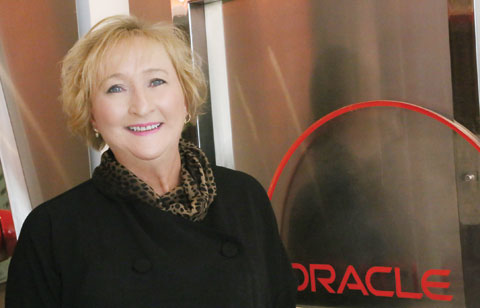 Jane Richardson
Jane RichardsonKUWAIT: With the emergence and growth of new technologies like big data, Artificial Intelligence, machine learning and cloud computing, the demand for IT and computer science skills has consistently risen and will continue to rise for the foreseeable future globally, said Jane Richardson, Senior Director, Oracle Academy, EMEA in an interview. Excerpts:
Kuwait Times: What is the level of skills in IT in the region, especially in Cloud?
Richardson: A recent report from the World Economic Forum shows that some of the most common high-skilled jobs in the MENA region include commercial bankers, corporate finance specialists, accountants, schoolteachers, academics, engineers, quality assurance professionals and information technology consultants. The report also states that the STEM talent pool is mainly dominated by a specialization in Engineering, Manufacturing and Construction (29 percent), with a smaller set of professionals specialized in Information and Communication Technologies (13 percent), Natural Sciences, Mathematics and Statistics (8 percent).
Therefore with the emergence and growth of new technologies like big data, Artificial Intelligence, machine learning and cloud computing, the demand for IT and computer science skills has consistently risen and will continue to rise for the foreseeable future globally.
This report also states that across the MENA region, substantial opportunity exists for creating high value, formal jobs in the IT sector. Changing technologies mean that employers are seeking different skills.
This trend is reflected globally. Recent studies2 from Oracle Academy and Burning Glass Technologies found that in the US, roughly two-thirds of the highest-paying and fastest-growing jobs in the fields of design, marketing, engineering and data analysis demand computer science skills. In both Singapore and the US, the studies indicated a trend towards "hybrid jobs," or roles that combine skill sets from different fields, including computing.
An example of a "hybrid job" would be a mobile app developer demanding skills in programming, design, marketing, and User Interface (UI)/User Experience (UX).
KT: What modules in your curriculum are more popular? What does that say about the on-demand skills in the region?
Richardson: Oracle, through its flagship Oracle Academy program, advances computer science education and makes it accessible to students globally to drive knowledge, innovation, skills development, and diversity in technology fields. Oracle Academy leverages Oracle's technology leadership to deliver comprehensive programs to secondary schools, vocational schools, two- and four-year colleges, and universities.
Oracle Academy partners with educational institutions to provide a variety of resources, including technology, curriculum and courseware, student virtual conferences, educator training, and Oracle industry certification and exam preparation materials.
With Oracle Academy, students develop IT and business skills using software that is used widely across hundreds of industries.
We see varying interests across the wide range of Oracle Academy courses in database design, SQL, PL/SQL, Java programming and application development across different countries. Interest in cloud computing is however ubiquitous.
Before students can write applications in the cloud, they have to master foundational computing - including SQL and PL/SQL skills and object-oriented programming. Data is at the core of so many modern innovations - big data, data science, machine learning and artificial intelligence among them - so developing SQL and PL/SQL skills are the basis for future growth and success.
In fact, the practice environments Oracle Academy offers in its SQL, PL/SQL, and Application Development courses are cloud based. With Oracle Application Express (APEX), users design, develop and deploy database-driven applications using only a web browser. Through full academic curriculum, Oracle Academy students and faculty gain hands-on cloud-based computing experience by using APEX.
KT: How many students and IT professionals do you target annually? Who is the ideal candidate?
Richardson: Each year, Oracle Academy reaches more than 3.5 million students in 120 countries. The program is open to accredited, degree and diploma-granting institutions. Once an institution is a member, any of its teachers and students can benefit from Oracle Academy. Additionally, educators, educational administrators, and students can join Oracle Academy as individual members and gain direct access to Oracle Academy benefits.
From the MENA region, in the 2016 - 2017 academic year, Oracle Academy has members in the UAE, Oman, Saudi Arabia, Jordan, Qatar and Egypt. In the UAE specifically, Oracle Academy now has members across 28 Higher Education institutions supporting over 75 University faculty members and 11, 000+ students.
We encourage students to consider developing foundational programming like those mentioned in our Oracle Academy and Burning Glass Technologies report, since these skills are much more in demand outside of the IT sector itself.
KT: Are there certifications tied to the training? Are they open-based industry certifications or proprietary Oracle?
Richardson: Oracle Academy curriculum is developed specifically as academic courseware; our goal is to help provide students with the skills they need to thrive in the modern global economy. Our curriculum is modular, making it easy for educators to embed it in entirety or in part in degree and diploma granting programs.
The curriculum is also aligned to national and international standards, like those developed by the Computer Science Teachers Association (CSTA) and the European Qualifications Framework (EQF). Both are recognized in the MENA region. Additionally, our Java courses can be used to prepare the students for the AP Computer Science A exam. Students who complete Oracle Academy exams included with the curriculum receive certificates of learning.
Additionally, Oracle Academy's Database Foundations and Java Foundation courses are aligned with Oracle Junior Certified Associate certifications, offered through Oracle University. Students who undertake Oracle Academy courses and then successfully complete these challenging exams can demonstrate their database and Java knowledge and skills with a distinction recognized by IT industry professionals.
This qualification can help the students show differentiation; whether they are preparing for college, applying to a graduate program, or competing for a first job or internship.









